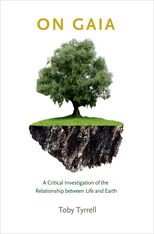 On Gaia: A Critical Investigation of the Relationship between Life and Earth
On Gaia: A Critical Investigation of the Relationship between Life and Earth
Contents
-
-
-
-
-
-
-
-
-
-
-
-
-
10.1. Reaching a Verdict on Gaia 10.1. Reaching a Verdict on Gaia
-
10.1.1. What Makes for a Successful Hypothesis? 10.1.1. What Makes for a Successful Hypothesis?
-
10.1.2. The Road Traveled … 10.1.2. The Road Traveled …
-
10.1.3. Weaving the Strands Together 10.1.3. Weaving the Strands Together
-
10.1.3. Comparing the Three Hypotheses 10.1.3. Comparing the Three Hypotheses
-
10.1.4. Kirchner’s Gaia Variants 10.1.4. Kirchner’s Gaia Variants
-
10.1.5. Concluding Comments on Gaia 10.1.5. Concluding Comments on Gaia
-
10.1.6. Where Next? 10.1.6. Where Next?
-
-
10.2. Why It Matters Whether the Gaia Hypothesis Is Correct or Not 10.2. Why It Matters Whether the Gaia Hypothesis Is Correct or Not
-
10.2.1. Planetary Management Requires Solid Understanding 10.2.1. Planetary Management Requires Solid Understanding
-
10.2.2. Planetary Scientists and Plane Mechanics 10.2.2. Planetary Scientists and Plane Mechanics
-
10.2.3. Gaia Imbues Undue Optimism 10.2.3. Gaia Imbues Undue Optimism
-
10.2.4. The Need for an Unbiased Worldview 10.2.4. The Need for an Unbiased Worldview
-
10.2.5. CFCs and the Ozone Hole 10.2.5. CFCs and the Ozone Hole
-
10.2.6. More Russian Roulette Anyone? 10.2.6. More Russian Roulette Anyone?
-
-
-
-
Cite
Abstract
This concluding chapter evaluates the Gaia hypothesis. Based on the evidence studied in this book, the chapter argues that the Gaia hypothesis is not a reasonable picture of how Earth and life interact with each other. There is no single body of facts or line of unimpeachable reasoning that sways the debate conclusively in favor of Gaia. The lack of any established bottom-up mechanism that can explain how Gaia is produced also weighs against it. No one has been able to explain convincingly how Gaia could emerge out of evolutionary or ecological dynamics. It is therefore perhaps not surprising that major evolutionary advances, such as the evolution of oxygenic photosynthesis, or the first foresting of the land by sizeable trees, have been associated with environmental catastrophes.
Sign in
Personal account
- Sign in with email/username & password
- Get email alerts
- Save searches
- Purchase content
- Activate your purchase/trial code
- Add your ORCID iD
Purchase
Our books are available by subscription or purchase to libraries and institutions.
Purchasing information| Month: | Total Views: |
|---|---|
| February 2024 | 3 |
| August 2024 | 2 |
| October 2024 | 3 |


Get help with access
Institutional access
Access to content on Oxford Academic is often provided through institutional subscriptions and purchases. If you are a member of an institution with an active account, you may be able to access content in one of the following ways:
IP based access
Typically, access is provided across an institutional network to a range of IP addresses. This authentication occurs automatically, and it is not possible to sign out of an IP authenticated account.
Sign in through your institution
Choose this option to get remote access when outside your institution. Shibboleth/Open Athens technology is used to provide single sign-on between your institution’s website and Oxford Academic.
If your institution is not listed or you cannot sign in to your institution’s website, please contact your librarian or administrator.
Sign in with a library card
Enter your library card number to sign in. If you cannot sign in, please contact your librarian.
Society Members
Society member access to a journal is achieved in one of the following ways:
Sign in through society site
Many societies offer single sign-on between the society website and Oxford Academic. If you see ‘Sign in through society site’ in the sign in pane within a journal:
If you do not have a society account or have forgotten your username or password, please contact your society.
Sign in using a personal account
Some societies use Oxford Academic personal accounts to provide access to their members. See below.
Personal account
A personal account can be used to get email alerts, save searches, purchase content, and activate subscriptions.
Some societies use Oxford Academic personal accounts to provide access to their members.
Viewing your signed in accounts
Click the account icon in the top right to:
Signed in but can't access content
Oxford Academic is home to a wide variety of products. The institutional subscription may not cover the content that you are trying to access. If you believe you should have access to that content, please contact your librarian.
Institutional account management
For librarians and administrators, your personal account also provides access to institutional account management. Here you will find options to view and activate subscriptions, manage institutional settings and access options, access usage statistics, and more.